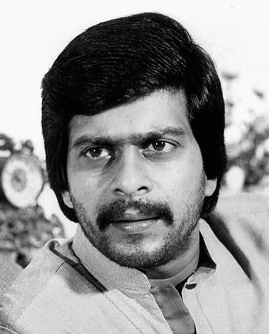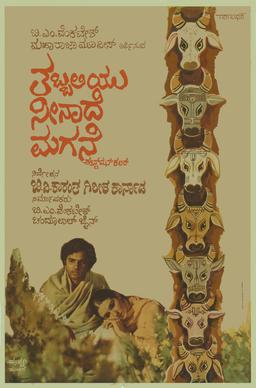
Kannada cinema, also known as Sandalwood, or Chandanavana, is the segment of Indian cinema dedicated to the production of motion pictures in the Kannada language widely spoken in the state of Karnataka. Kannada cinema is based in Gandhi Nagar, Bengaluru. The 1934 film Sati Sulochana directed by Y. V. Rao was the first talkie film released in the Kannada language. It was also the first film starring Subbaiah Naidu and Tripuramba, and the first screened in the erstwhile Mysore Kingdom. It was produced by Chamanlal Doongaji, who in 1932 founded South India Movietone in Bengaluru.

Kuppalli Venkatappa Puttappa, popularly known by his pen name Kuvempu, was an Indian poet, playwright, novelist and critic. He is widely regarded as the greatest Kannada poet of the 20th century. He was the first Kannada writer to receive the Jnanpith Award.

Girish Karnad was an Indian actor, film director, Kannada writer, playwright and a Jnanpith awardee, who predominantly worked in Kannada, Hindi, Tamil, Telugu, Malayalam and Marathi films. His rise as a playwright in the 1960s marked the coming of age of modern Indian playwriting in Kannada, just as Badal Sarkar did in Bengali, Vijay Tendulkar in Marathi, and Mohan Rakesh in Hindi. He was a recipient of the 1998 Jnanpith Award, the highest literary honour conferred in India.

Kota Shivaram Karanth, also abbreviated as K. Shivaram Karanth, was an Indian polymath, who was a novelist in Kannada language, playwright and an ecological conservationist. Ramachandra Guha called him the "Rabindranath Tagore of Modern India, who has been one of the finest novelists-activists since independence". He was the third writer to be decorated with the Jnanpith Award for Kannada, the highest literary honor conferred in India. His son Ullas is an ecological conservationist.

Babukodi Venkataramana Karanth widely known as B. V. Karanth was an Indian film director, playwright, actor, screenwriter, composer, and dramatist known for his works in the Kannada theatre, Kannada cinema, and Hindi cinema. One of the pioneers of the Parallel Cinema, Karanth was an alumnus of the National School of Drama (1962) and later, its director. He received the Sangeet Natak Akademi Award (1976), six National Film Awards, and the civilian honor Padma Shri for his contributions towards the field of art.

Shankar Nagarakatte was an Indian actor, screenwriter, director, and producer known for his work in Kannada-language films and television. A popular cultural icon of Karnataka, Nag is often referred to as Karate King. He directed the teleserial Malgudi Days, based on novelist R. K. Narayan's short stories and acted in some episodes as well. He won two National Film Awards, four Karnataka State Film Awards and two Filmfare Award South.

Thirthahalli is a panchayat town located in the Shimoga district of the state of Karnataka, India. It lies on the bank of the river Tunga and is also the headquarters of the Thirthahalli Taluk of Shimoga district.

Kuppali Puttappa Poornachandra Tejaswi was a prominent Indian writer and novelist in Kannada. He also worked as a photographer, publisher, painter, naturalist, and environmentalist. He made a great impression in the Navya ("new") period of Kannada literature and inaugurated the Bandaaya Saahitya genre of protest literature with his short-story collection Abachoorina Post Offisu. He is the son of noted Kannada poet Kuvempu.

Gubbi Hampanna Veeranna was an Indian theatre director. He was one of the pioneers and most prolific contributors to Kannada theatre. He established the drama company, Gubbi Sree Channabasaveshwara Nataka Company, which played a crucial role in promoting the Kannada theatre field. He has been conferred the title Nataka Ratna meaning "A Precious Jewel" in the theatre world. Gubbi Veeranna laid the foundation stone for the Kannada film industry. He established a studio, produced silent films in early days of cinema and produced good Kannada short films, He built theaters and introduced many actors including Dr Rajkumar, G.V Iyer, B.V Karanth, Girish Karnad and others to the Kannada film industry.
K. M. Chaitanya is a film director, documentary maker and theater person who works in Kannada cinema. He is known for directing Aa Dinagalu (2007).
Modern Kannada literature refers to the body of literature written in the Kannada language, a language spoken mainly in the Indian state of Karnataka. The Kannada script is the writing system used in Kannada literature. In the last forty years, eight modern Kannada authors have been awarded the Jnanpith award, a prestigious private literary award in India. In addition, the Sahitya Akademi Award, the second-highest award for literature granted by the Government of India, has been conferred upon Kannada writers fifty times.

Anuradha, known by her stage name Tara, is an Indian politician and actress active in the Kannada cinema. She joined the Bharatiya Janata Party (BJP) in 2009 and is currently a nominated member of the Karnataka Legislative Council.

Tabbaliyu Neenade Magane or Godhuli is a 1977 Indian drama film co-directed by Girish Karnad and B. V. Karanth, starring Kulbhushan Kharbanda, Maanu, Om Puri and Naseeruddin Shah. It is based on the Kannada novel Tabbaliyu Neenade Magane, written by S. L. Byrappa as an allegory for nation-building and the clash of modernity with tradition in rural India. It portrays the story of a modern agriculturist who returns from the US after studying agriculture and brings his American wife to the village. The film won the Filmfare for ‘Best Film’ (Kannada) and Maanu won ‘Best Actor’ (Kannada) at the 25th Filmfare Awards South (1978). The film was made in Hindi and Kannada versions: Godhuli.

Kempe Gowda is a 2011 Kannada-language action film starring Sudeepa and Ragini Dwivedi in the lead roles. The film was directed by Sudeepa and produced by Shankar Gowda. It is a remake of the Tamil-language film Singam directed by Hari. Arjun Janya has composed the music. A namesake sequel titled Kempegowda 2 was released in 2019.

Kaadu (transl. Forest) is a 1973 Indian Kannada-language film written and directed by Girish Karnad. The screenplay was based on a novel of the same name by Srikrishna Alanahalli. It stars Master G. S. Nataraj, Amrish Puri and Nandini Bhaktavatsala. The film won awards at the 21st National Film Awards and the 21st Filmfare Awards South.

K. Suchendra Prasad is an Indian actor of film, stage, and television.

Kanuru Heggaditi or Kanooru Heggadithi(meaning: Proprietress of Kanuru) is a Kannada language novel written by author and poet, Kuvempu, in 1936. Based on the novel, a Kannada movie Kanooru Heggadithi directed by Girish Karnad, was released in 1999.

Bharaate (transl. Blast) is a 2019 Indian Kannada-language action drama film written and directed by Chethan Kumar. The film is produced by Suprith under the Sri Jagadguru Movies banner and presented by Sriimurali under Aagastya Enterprises. It features Sriimurali in a dual role, alongside Sreeleela. The supporting cast includes Tara, Rangayana Raghu, Suman, P. Sai Kumar, P. Ravi Shankar, Ayyappa P. Sharma, Sharath Lohitashwa, All Ok and Sadhu Kokila. The score and soundtrack were composed by Arjun Janya, while cinematography and editing were handled by Girish R. Gowda and Deepu S. Kumar.
















